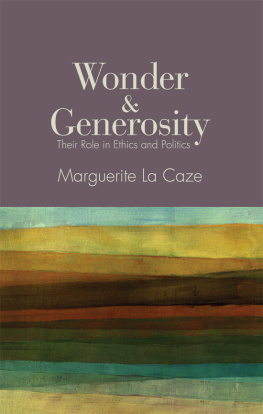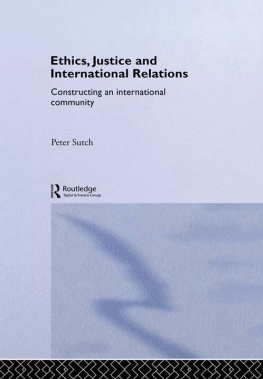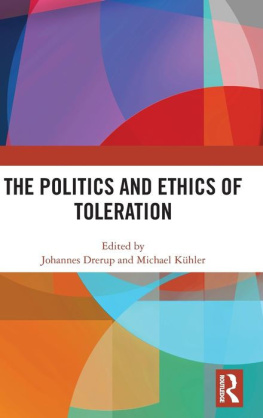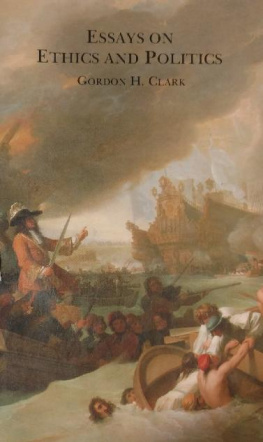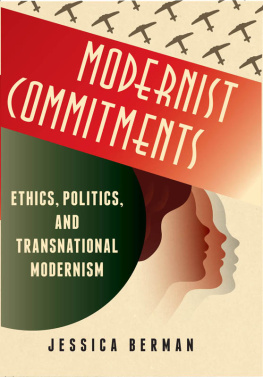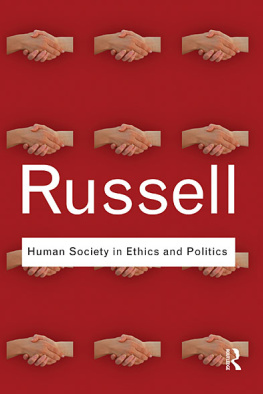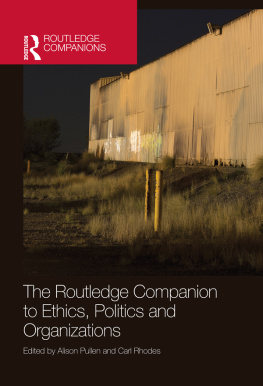La Caze - Wonder and Generosity: Their Role in Ethics and Politics
Here you can read online La Caze - Wonder and Generosity: Their Role in Ethics and Politics full text of the book (entire story) in english for free. Download pdf and epub, get meaning, cover and reviews about this ebook. year: 2013, publisher: State University of New York Press, genre: Romance novel. Description of the work, (preface) as well as reviews are available. Best literature library LitArk.com created for fans of good reading and offers a wide selection of genres:
Romance novel
Science fiction
Adventure
Detective
Science
History
Home and family
Prose
Art
Politics
Computer
Non-fiction
Religion
Business
Children
Humor
Choose a favorite category and find really read worthwhile books. Enjoy immersion in the world of imagination, feel the emotions of the characters or learn something new for yourself, make an fascinating discovery.
- Book:Wonder and Generosity: Their Role in Ethics and Politics
- Author:
- Publisher:State University of New York Press
- Genre:
- Year:2013
- Rating:3 / 5
- Favourites:Add to favourites
- Your mark:
- 60
- 1
- 2
- 3
- 4
- 5
Wonder and Generosity: Their Role in Ethics and Politics: summary, description and annotation
We offer to read an annotation, description, summary or preface (depends on what the author of the book "Wonder and Generosity: Their Role in Ethics and Politics" wrote himself). If you haven't found the necessary information about the book — write in the comments, we will try to find it.
La Caze: author's other books
Who wrote Wonder and Generosity: Their Role in Ethics and Politics? Find out the surname, the name of the author of the book and a list of all author's works by series.
Wonder and Generosity: Their Role in Ethics and Politics — read online for free the complete book (whole text) full work
Below is the text of the book, divided by pages. System saving the place of the last page read, allows you to conveniently read the book "Wonder and Generosity: Their Role in Ethics and Politics" online for free, without having to search again every time where you left off. Put a bookmark, and you can go to the page where you finished reading at any time.
Font size:
Interval:
Bookmark:
Wonder & Generosity
Their Role in Ethics and Politics
Marguerite La Caze

Published by State University of New York Press, Albany
2013 State University of New York
All rights reserved
Printed in the United States of America
No part of this book may be used or reproduced in any manner whatsoever without written permission. No part of this book may be stored in a retrieval system or transmitted in any form or by any means including electronic, electrostatic, magnetic tape, mechanical, photocopying, recording, or otherwise without the prior permission in writing of the publisher.
For information, contact State University of New York Press, Albany, NY
www.sunypress.edu
Production by, Ryan Morris
Marketing by, Michael Campochiaro
Library of Congress Cataloging-in-Publication Data
La Caze, Marguerite, 1964
Wonder and generosity : their role in ethics and politics / Maguerite La Caze.
p. cm.
Includes bibliographical references and index.
ISBN 978-1-4384-4675-2 (hardcover : alk. paper) 1. Generosity. 2. Wonder. 3. Political ethics. I. Title.
BJ1533.G4L39 2013
179'.9dc23
2012026096
10 9 8 7 6 5 4 3 2 1
To my parents, Charles and Val La Caze
Acknowledgments
W riting this book has been a real pleasure and has involved endless discussions and support over years. Much of the work has been presented at conferences, and I would like to thank audiences at the Australasian Society for Continental Philosophy, the Society for Philosophy in the Contemporary World, Women's Studies, Feminist Ethics and Social Theory, International Association of Women Philosophers, Women in Philosophy, Derrida Roundtable, Australasian Association for Philosophy, Benevolence, and Society for European Philosophy conferences for lively discussions. I have also presented sections to the philosophy seminar at University of Queensland, at the UQ-UNE weekend, the philosophy department at the University of New South Wales, the Centre for Applied Philosophy and Public Ethics, ANU, and I gained a great deal from those discussions. Thank you.
I am grateful to the Australian Research Council for their support through an Australian Research Fellowship in the years 200307. The School of History, Philosophy, Religion and Classics and the Centre for the History of European Discourses have supported research activities for the European Philosophy Research Group, and I appreciate that very much. Colleagues and friends in the school have discussed the issues with me, provided advice, and supported my research, including Michelle Boulous Walker, Gil Burgh, Phil Dowe, Gary Malinas, Michael Lattke, and Clive Moore. Lorraine Code, Rosalyn Diprose, Max Deutscher, Michael Levine, Frances Gray, Michle Le Duff, Paul Formosa, and Andrew Schaap have all very kindly given helpful feedback. Damian Cox, as always, has talked with me every step of the way and commented on drafts unstintingly, showing a level of generosity that I deeply acknowledge. My family members and friends were tireless in their support and so I am indebted to them for that.
Teaching has also been important to development of the book and I especially thank the students in my Ethics and the Passions course the last few years for their insights. Anonymous reviewers have helped improve my thinking at many points, so thanks to all of them. I would also like to thank a number of journals and presses for permission to reprint work that the chapters are based on: Wiley-Blackwell for The Encounter between Wonder and Generosity, Hypatia: A Journal of Feminist Philosophy 17, no.3 (2002): 119, and Love, That Indispensable Supplement: Irigaray and Kant on Love and Respect, Hypatia: A Journal of Feminist Philosophy 20, no.3 (2005): 92114; Cornell for If You Say So: Feminist Philosophy and Anti-Racism, in Racism in Mind, ed. Michael Levine and Tams Pataki (Ithaca: Cornell University Press, 2004), 26178; Sage for At the Intersection: Kant, Derrida, and the Relation between Ethics and Politics, Political Theory: An International Journal of Political Philosophy 35, no. 6 (2007): 781805; Philosophy Today for Not Just Visitors: Cosmopolitanism, Hospitality, and Refugees, Philosophy Today 48, no.3 (2004): 31324; Springer for Should Radical Evil be Forgiven? in Forensic Psychiatry: Influences of Evil, ed. Tom Mason (Totowa: Humana Press, 2005), 27393; and Palgrave for The Asymmetry between Apology and Forgiveness, Feature Article: Theory and Practice, Contemporary Political Theory 5, no.4 (2006): 44768. Finally, I would like to express my gratitude to three anonymous reviewers for SUNY Press for insightful suggestions and to Andrew Kenyon, Acquisitions Editor, philosophy, for SUNY, for his encouragement and professionalism.
Introduction
T his book concerns the ethical and political significance of two passions: wonder and generosity. Wonder is based on accepting others' differences, and generosity is based on self-respect and mutual respect. When both are cultivated, they supplement each other and form the basis for an ethics and politics. This ethics and politics includes both an acceptance of sexual and cultural difference, for example, and a recognition of our common humanity. My starting point is a study of the important insights into responding to difference raised by Luce Irigaray in . I began thinking about these questions when reading her incredibly suggestive and fruitful essay Wonder: A Reading of Descartes, The Passions of the Soul. In that essay Irigaray argues that Descartes is right to place wonder as the first of all the passions and that wonder can provide the basis for an ethics of sexual difference because it is prior to judgment and so free of hierarchical relations. Wonder is surprise at what is unusual, what stands out against a background of familiar, everyday experiences. It is different from other passions. Other passions are a reaction to what we find pleasant or distasteful about an object, whereas wonder is a direct response to an object as it is.
Wonder involves recognizing others as different from ourselves in that it is a response to what is unfamiliar and a way of finding the unfamiliar in the familiar. Thus, wonder provides a basis for a response to others that accepts their difference. As is well known, Irigaray believes that the most important difference between human beings is the difference between the sexes, a difference that traditional ethics such as utilitarianism or Kant's ethics do not fully recognize or fully understand. In my view, the response of wonder should be extended to other kinds of differences between human beings. Ethnic, cultural, and racial differences are all grounds for wonder.
However, wonder alone cannot provide the basis of the ethics and politics of respect for difference because it introduces the risk of regarding others as exotic or strange. I argue that we also need an ethical basis for respect for commonality or similarity. In , Descartes argues that generosit, or appropriate self-esteem or respect, is the proper basis for ethics. Generosity involves regarding others as essentially similar to ourselves, in that we share a common basis for action and responsibilitythat is, free will. This idea of a respect for what is common between human beings needs to work with the idea of wonder in a complex way. Wonder and generosity are responses that we can cultivate in ourselves and so they have a normative dimension and can become virtues. My project focuses on wonder and generosity in order to develop a positive guide to ethics and to political change. This is a different approach from focusing on the problem of violence that characterizes so much of recent history and continental thought, and also from approaches, for example, neo-Hegelian ones, that take struggle between adversaries to be the basis of ethical and political thinking.
Next pageFont size:
Interval:
Bookmark:
Similar books «Wonder and Generosity: Their Role in Ethics and Politics»
Look at similar books to Wonder and Generosity: Their Role in Ethics and Politics. We have selected literature similar in name and meaning in the hope of providing readers with more options to find new, interesting, not yet read works.
Discussion, reviews of the book Wonder and Generosity: Their Role in Ethics and Politics and just readers' own opinions. Leave your comments, write what you think about the work, its meaning or the main characters. Specify what exactly you liked and what you didn't like, and why you think so.

